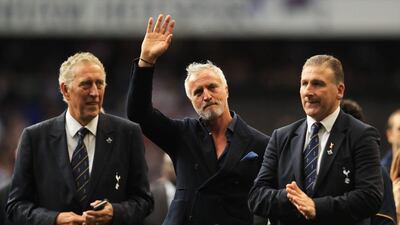Go to Turf Moor on a matchday and the price of a ticket includes a history lesson. A former player is invariably brought out at half time. Sometimes it is a survivor of Burnley’s 1987 team who narrowly avoided relegation from the Football League.
Supporters who, depending upon the opposition, have been watching some of the world’s most famous footballers are then greeted by the sight of one who, as a member of the 90th best team in England 30 years ago, may not have been in the top 1,000 in the country at the time. The guest is nevertheless guaranteed generous applause. It can seem incongruous. It is also right.
__________________________________
Read more
■ Premier League team of the week: Kane gives White Hart Lane a fitting finale
■ 'True warrior and Man City legend': A tribute to the departing Pablo Zabaleta
__________________________________
Football can seem to live in the present, but it is about the past too. It provides a context which is essential for understanding. It gives clubs an identity which can be shaped by any one player or team, but which is nevertheless greater than them. They are part of something bigger. It links them with those who came before and those who follow after. That bond, that common denominator, is most evident to the fans who have cheered them all.
It was apparent in the closing ceremony at White Hart Lane on Sunday, just as it was in the equivalent farewell to Upton Park a year ago. To critics, these events can seem exercises in mawkish sentimentality, yet it is not necessary to have an allegiance to Tottenham Hotspur to find Sunday's events moving.
It was about the connection between then and now, symbolised when Mauricio Pochettino and Ricky Villa walked around the pitch together. The current manager was only nine when his fellow Argentine scored arguably the greatest goal in FA Cup final history. It was about the way the legends, as they were branded, included David Howells, Justin Edinburgh and Vinny Samways, 1991 FA Cup winners but prosaic players who sacrificed themselves for greater talents. They were nonetheless correctly celebrated for their service.
It was about the way men with little in common reached for their phones to record it for posterity. The flamboyant David Ginola seemed to be filming himself. The 72-year-old Martin Chivers, the 44-goal hero of the 1971/72 season, looked rather less proficient with technology but also wanted to capture the moment. So did one half his age.
Dimitar Berbatov can cut an ethereal figure. His game was characterised by distant, nonchalant expressions of superiority. He grew up 2,000 kilometres from White Hart Lane in Bulgaria, and yet he was filming too, recording images of four men who won the league-and-cup double in 1961, 20 years before his birth, showing the iceman felt the emotion of the occasion.
Berbatov left Tottenham in 2008. His move to Manchester United was acrimonious. Yet the ovation he got showed relations have been repaired. He has forgiveness and his place in the pantheon. His time at Tottenham touched Berbatov; he appreciated being back in the fold.
It was tempting to recall the words attributed to Keith Burkinshaw, Spurs’ 1984 Uefa Cup-winning manager. “There used to be a football club over there,” he is alleged to have said in annoyance after Tottenham were listed on the stock exchange.
Perhaps Burkinshaw was ahead of his time. Since then, more football clubs have become commercial entities, investments and playthings. They have been used as vehicles for ambition and as stepping stones. They can seem soulless when run by the wrong people and appear depressing when they enter tailspins. There are times when searching for some meaning in it all feels a fruitless task.
Tottenham have had seasons of mediocrity and times when they seemed a selling club. It is easier to applaud them now, with their highest finish in 54 years guaranteed and with a genuine progressiveness about Pochettino’s regime. Yet to see the reception granted to men who served them with such distinction over the past six decades and their conspicuous pleasure in being at White Hart Lane was a reminder there will always be a football club there.
Follow us on Twitter @NatSportUAE
Like us on Facebook at facebook.com/TheNationalSport


